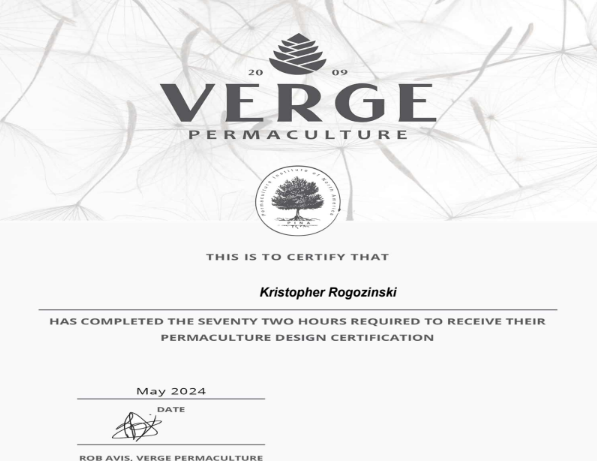About Frostwood
At Frostwood, we believe in living with the land—not just on it.
Founded in the heart of the Blue Ridge Mountains in Brevard, NC, Frostwood is a working homestead, off-grid retreat, and educational space rooted in regenerative design and self-reliance.
We offer hands-on workshops, permaculture consulting, and short-term stays in our off-grid yurt—giving others a chance to experience practical solutions for a more sustainable world.
About Me
I’m a certified permaculture designer (Verge Permaculture / PINA), licensed North Carolina Realtor, real estate investor, homesteader, and lifelong problem-solver.
I built Frostwood to demonstrate different ways of living in harmony with nature, without sacrificing comfort or creativity. This place is a living example of that belief—powered by the sun, fed by the land, and built with intention.
Whether you're just getting started or looking to transform your own property, I’d love to help you grow something meaningful.
What We Offer
Permaculture Design Consulting – Virtual or on-site design services tailored to your land and goals
Hands-on Workshops – Chicken processing, goat butchery, homestead systems & more
Homestead Tours – Learn how water, soil, animals, and humans can work in synergy
Yurt Nature Retreat – Book a unique off-grid getaway through Airbnb
Our Approach
We follow permaculture principles while adapting to real-world challenges.
Designs here aren’t theoretical—they’re lived.
Permaculture Principles
Observe and Interact - By taking time to engage with nature, we can design solutions that suit our particular situation.
Catch and Store Energy - Use resources when they are abundant to prepare for times of need. This can apply to sun, wind, water, and biological energy.
Obtain a Yield - Ensure that you are getting useful rewards as part of the work that you are doing.
Apply Self-Regulation and Accept Feedback - We need to discourage inappropriate activity to ensure that systems can continue to function well.
Use and Value Renewable Resources and Services - Make the best use of nature's abundance to reduce our consumptive behavior and dependence on non-renewable resources.
Produce No Waste - By valuing and making use of all the resources that are available to us, nothing goes to waste.
Design from Patterns to Details - By stepping back, we can observe patterns in nature and society. These can form the backbone of our designs, with the details filled in as we go.
Integrate Rather than Segregate - By putting the right things in the right place, relationships develop between those things and they work together to support each other.
Use Small and Slow Solutions - Small and slow systems are easier to maintain than big ones, making better use of local resources and producing more sustainable outcomes.
Use and Value Diversity - Diversity reduces vulnerability to a variety of threats and takes advantage of the unique nature of the environment in which it resides.
Use Edges and Value the Marginal - The interface between things is where the most interesting events take place. These are often the most valuable, diverse, and productive elements in the system.
Creatively Use and Respond to Change - We can have a positive impact on inevitable change by carefully observing and then intervening at the right time.

